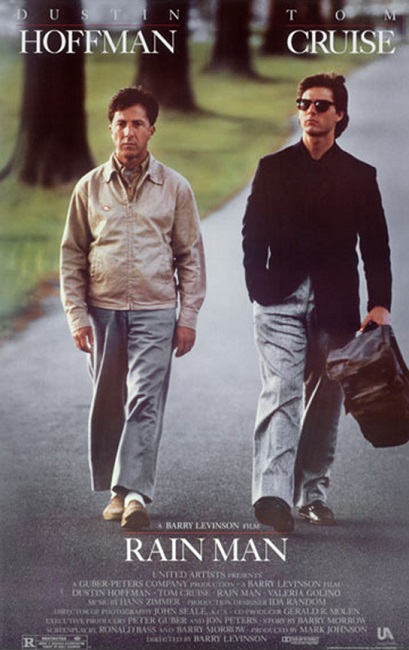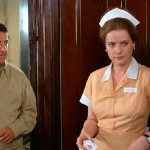
Rain Man – 1988
Rain Man brings us back down to earth. The last four Best Picture Winners have been films that took us to the past and put us in foreign locations. But here we are with Tom Cruise and Dustin Hoffman in a film that takes place in the year in which it was made. I had seen bits and pieces of this movie, but never the whole thing in one sitting.
Finally! Finally we get to see Hoffman turn in a performance that justifies all the accolades that have been given to him over the years. This is the first time I have seen him play a character that was not so one note. Now, I understand that anyone who has seen Rain Man might say that his character was VERY one note. That was the whole point of his character. But we’ll get into that in a bit.
Let me back up and start with a little plot, a few likes and dislikes, and then a word or two about costumes and music. Somewhere in there we’ll get into the characters. There is a lot to cover.
The film opens with Tom Criuse playing the part of Charlie Babbitt. He is a fast talking high-end car salesman who is selling cars to an interested buyer if he can get the vehicles clear of customs. It promises to be a very lucrative deal if he can pull it off. The complications start when he gets a phone call saying his father has died. Without going too deeply into the story, he flies to Cincinnati for the funeral and the reading of the will. He learns that aside from a fancy car and some rose bushes, he has been left nothing of his father’s considerable estate. A sum of $3 million has been left to Raymond, his brother, played by Dustin Hoffman.
The problem is he had no idea that he had a brother. Raymond had been hidden from him. He is a patient at a mental institution, an autistic savant. The autism means that his brain does not function in a way that allows him to competently interact with the real world. He cannot take care of himself and needs constant supervision. Savant means that his brain has highly specialized abilities that are far beyond normal human levels. For example, he has a photographic memory that is 100% accurate, though he generally has little understanding of the subject matter. He is also a human calculator, able to instantly count hundreds of objects at once, or do long multiplication instantly in his head, though again, he cannot understand what the numbers mean.
In order to get his hands on his half of the money, Charlie kidnaps Raymond from the institution and tries to take him to LA. However, part of Raymond’s condition is that he needs routine in just about everything he does or he becomes deathly afraid. He must eat the same foods, watch the same TV programs, and all on the tight schedule programmed by the institution. And since Raymond will not get on an airplane (he can recall with perfect accuracy the dates, airlines, flight numbers, and number of fatalities of every airplane crash ever to occur) Charlie is forced to drive cross country with him.
In the mean time, Charlie’s car deal goes bad and he loses everything. So what does he end up doing? He takes Raymond to Vegas and uses his savant abilities to count cards at the black-jack table and make enough money to pay for his debts.
Cruise did a good enough job. He was the perfect self-centered asshole precursor to the me-me-me yuppie of the 90s. Honestly, as I watched the film, the thought occurred to me that Hoffman could have done the role justice in his younger years. But Cruise knew what he was doing. The official movie trailer described Charlie as a smooth-talking salesman. But I think abrasive jerk would have been more accurate. He was such an ass to the other characters in the film, he was starting to piss me off.
Interesting note: Hoffman was actually originally slated to play the character of Charlie, opposite Bill Murray playing Raymond.
Hoffman, however was incredible. He won the Oscar for Best Actor, and I think he really deserved it. The way he behaved, the repeated and repeated lines and phrases, the autistic mannerisms, the dead, uninterested look in his eyes, the nervous rocking back and forth, the fits of terror when he lost control, all made for an unforgettable character. This was truly the work of a master actor and in this case, I really have to tip my hat to him. It is a performance that needs to be seen.
The film is an easy one to like, but not everything was perfect. There was actually only one small thing I didn’t really like. The only sizeable female character in the film was Charlie‘s girlfriend, Susanna, played by Valeria Golino. I’m not sure why, but I have always considered Golino to be an unremarkable and average actress. She is pretty enough if she doesn’t have to speak. In fact, she has won numerous awards for Italian cinema, but her accent was so strong that I sometimes had difficulty understanding her. And her character, which, I must admit, had nothing to do with her, was poorly written. I mean, she is supposed to be Charlie’s long-time girlfriend. But really, why would anyone with an ounce of self-esteem put up with such a self-centered jerk for that long? The only intelligent thing she did in the film was to leave him, and there was no reason for her to come back later.
OK – maybe that wasn’t so much bad writing… just a character I didn’t like.
The costumes were very appropriate for the late 80s. This was the era of Miami Vice, where shirts were buttoned all the way up without ties, suit jackets had very square shoulders, and sunglasses were worn even at night. Put a gun in Tom Cruise’s hand and he could have joined Crocket and Tubbs.
The music was nominated for best Original score, though it did not win. I actually thought the music was a little disjointed. I mean, I felt that it sometimes didn’t seem to fit the movie. It reminded me of the score to a 1992 movie called Medicine Man by Jerry Goldsmith. Sometimes, I thought the music was a bit too… Rain Forest instead of Rain Man.
Now, here is something I have to question: How accurately did the writers, and subsequently Hoffman, come to portraying actual autism? Apparently, very accurately. There really are people who are very similar to Raymond, having many of the same characteristics and abilities. The problem comes when people see his performance and make the assumption that all autistics are just like that. In fact, autism comes in many forms and is only rarely coupled with savant abilities. So, in light of that truth, I don’t mind that they chose to use that rare combination to tell their story. The movie never tried to say that all autistic people are like Raymond.
Interesting note: Another misconception fostered by the film is that card counting is illegal in the United States. In fact, it is legal, though it is difficult to do and frowned upon by casinos.
Now, all that being said, there was really not very much emotional depth in the film. As you might guess, when Charlie and Raymond spend a week together, they get to know each other and they are both changed by the experience. They form a connection and a bond. The one most affected by this bond is Charlie, so the real main character of the movie is not Raymond, but Charlie. He goes through the most profound changes and becomes a better person by the end.
And I really liked the tiny little sub-plot that explained where the title of the movie came from. This was the story of Charlie’s infancy which also explained why Raymond was sent away to an institution. The scene in which this story is told is one of real connection between the two brothers. I wish there had been just a few more scenes like it to make Charlie’s emotional journey more substantial. You see, though his character was more mellow by the end, and maybe a bit more mature, he still retained some of those negative qualities that made me dislike him at the beginning. But I guess it just goes to show you that though a tiger can change his stripes, it doesn’t happen over-night.
Overall, this was a very good movie, and worth seeing. Hoffman’s performance was amazing. The film took home 4 Oscars. Aside from Best Picture and Best Actor, it also won for Best Director (Berry Levinson) and Best Writing, Original Screenplay (Barry Morrow and Ronald Bass).
Interesting note: That character of Raymond was based on real-life savant Kim Peek, the biggest difference being that Peek was not autistic.








